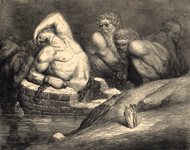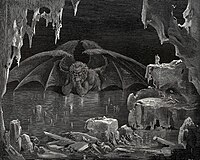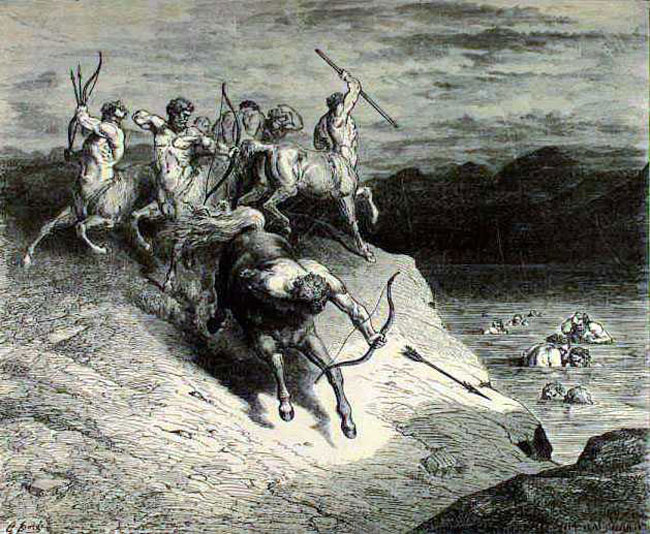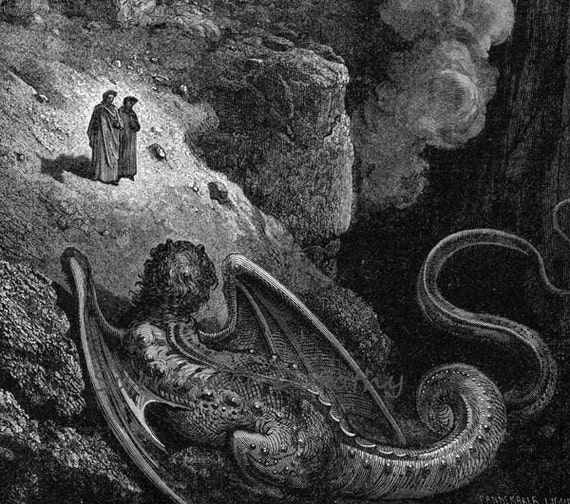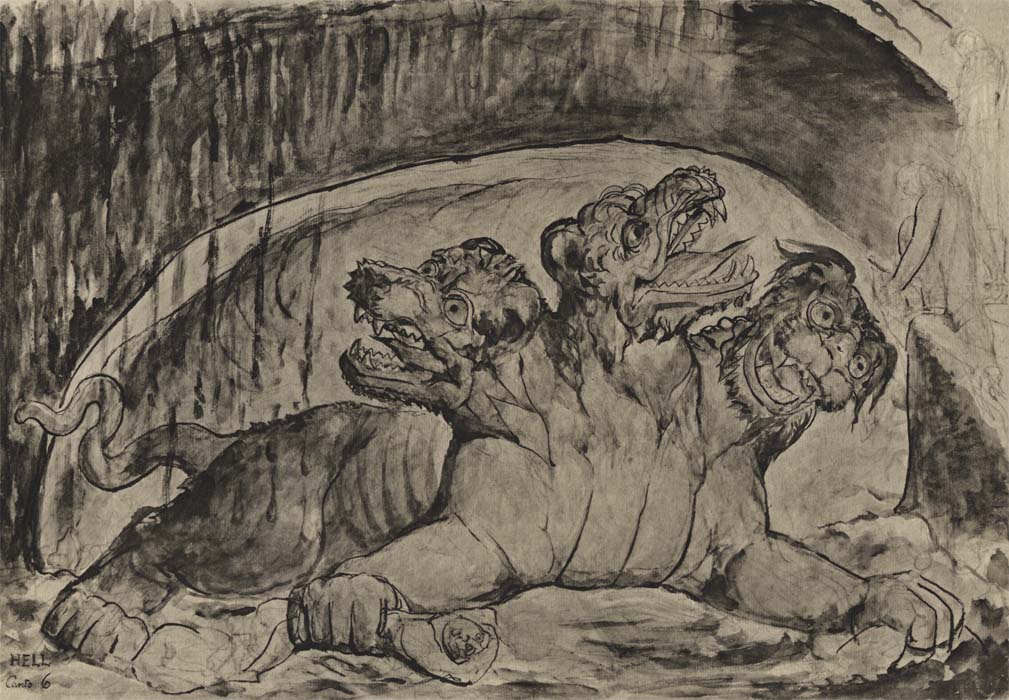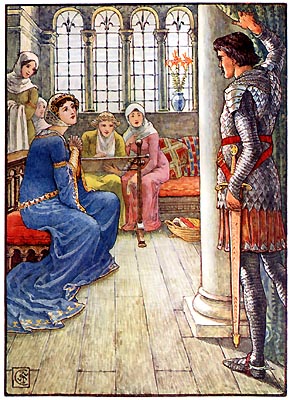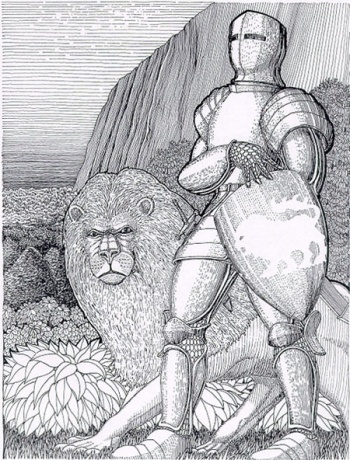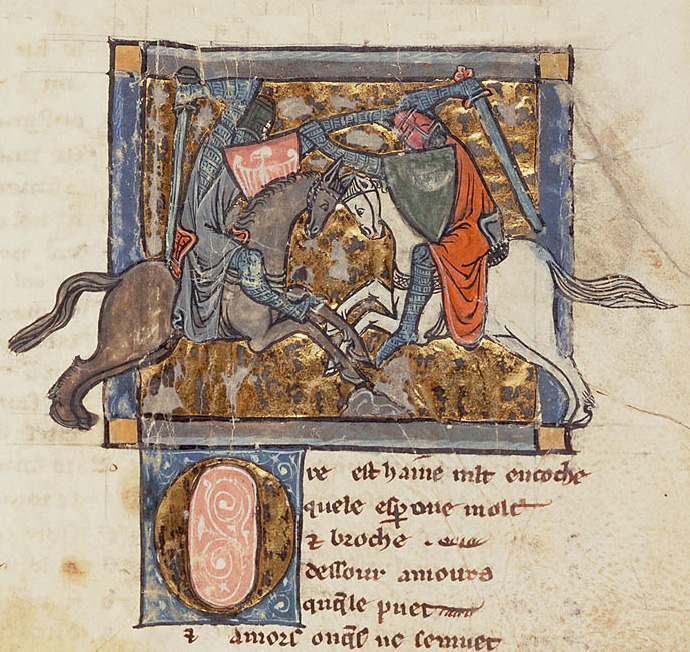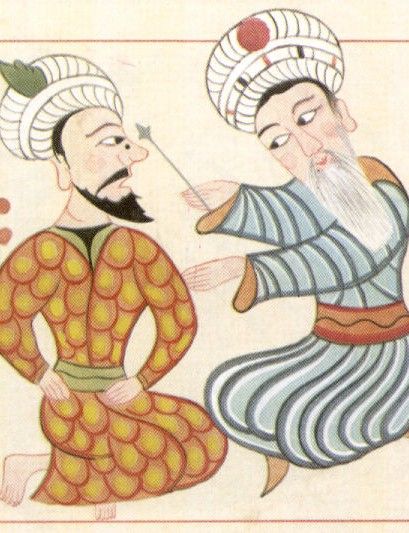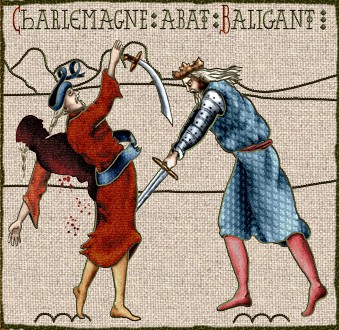It has been accepted that this story, written by Chrétien de Troyes, was forced upon the writer by Marie de Champagne. A main reason for this acknowledgment hinges on the fact that he blatantly states this inconvenience in the opening prologue. Chrétien's ideology of love also helps to concrete his resistance to this demand.
The Knight of the Cart, also referred to as simply Lancelot, has a more contemporary view of love especially outside of marriage. Chrétien believed highly in the ideals of the church and saw any romance/love outside of marriage as adultery. The story is known as a "a popular Celtic abduction story, or
aithed" (10). Chrétien was able to allude to the "tragic love tale of Piramus and Thisbe" in order to legitimize his knowledge of classic material.
 |
| http://www.geocities.ws/jessica12_80/plot.html |
At Camelot, King Arthur holds his court. It is quite extravagant including everything you would expect of a king. King Arthur is greeted by a mysterious knight who comes into court dressed for battle. The knight, later known as Meleagant, addresses the king and tells him of all Arthur's loyal subjects he has imprisoned. He does not intend to give them back but tells the leader of an ultimatum.
"Sir, if at your court there is even one knight in whom you have faith enough to dare entrust the queen to accompany her into these woods where I am going, I give my oath that I will await him there and will deliver all the prisoners who are captive in my land -- if he is able to win the queen from me and bring her back to you" (208). Another knight, only known as Kay, hears this challenge and immediately goes to the king and tells him of his departure from the court. The king is sad and tries to stop Kay, but the knight is firm in his resolve. King Arthur finally asks the queen to convince Kay to stay and she approaches the knight while he sits with his comrades. The knight is determined to travel onward. He only agrees to stay after the queen refuses to rise and she promises to grant his mysterious request. After proceeding to the king, Kay request to fulfill the desired challenge from the illusive knight. With a heavy heart Arthur agrees. Kay's request is seen as being "...proud, rash, and foolhardy" (209). The queen and Kay prepare to leave.
Nobody attempts to follow the duo until Sir Gawain publicly tells King Arthur that someone must follow in order to learn of the queen's final whereabouts. He also is concerned about how prepared Kay is for the duel. After the king agrees to ride with Sir Gawain many of the townspeople volunteer to help. Gawain goes on his own path and meets Kay's horse. The animal is riderless and many of the parts to the saddle are destroyed/stained with blood. Gawain continues riding on into the forest and he meets a name-less knight, later on known to be Lancelot, who is riding a labored horse. The stranger greets Gawain and asks to either loan or be gifted one of the extra horse accompanying the pursuer. Gawain gives the knight whatever horse he chooses, but his choice is hastily made and the horse dies soon into his travels. Lancelot is then forced to ask a dwarf for information of his lost queen. The dwarf refuse to give him any knowledge of the queen but in turn states that if he were to travel in his cart he would divulge information.
Carts are a social symbol during this time period. These modes of travel were scarce and therefore reserved for criminals. If one was seen on a cart they would lose all of their feudal rights as well as never be allowed in court again. Lancelot hesitates for a moment, but ultimately decides his honor is worth less then the queens life.
This decision helps to shape the rest
 |
| http://www.sjsu.edu/people/cynthia.rostankowski/courses/hum1b/ |
of the piece. It gives the literature its title, as well as a basis for Lancelot's character. Sir Gawain comes upon the unlikely duo and is appalled at the thought of riding with the dwarf. Instead, in order to learn of queen's location, he follows the cart. They go into town where Lancelot is ridiculed and mocked. They continue on until they reach the dwarf's lodging. Sir Gawain is greeted warmly by an attractive girl who then asks what Lancelot did to deserve passage in the cart.
This question will continually be a point of interest for many onlookers throughout the literature. The dwarf silently leaves the room and the two men take off their armor, fill their bodies with nourishment, and prepare for bed.
The next morning Lancelot sees his queen through a window as she proceeds in a funeral march on horseback by her captor. Sir Gawain is able to stop Lancelot from doing anything rash and the two prepare to follow the funeral procession. They ride until mid-morning and meet a girl who is willing to tell them the location of the queen. She warns the men that the road will be dangerous and anyone who rides into the land will suffer many tribulations. She requests a promise from each man in exchange for the information and the men agree to these terms. She then explains the two passages that lead to Meleagant, the prince of Gorre. She warns the men that no one has ever returned from the land with out the kings consent. The two ways include "The Underwater Bridge" and "The Sword Bridge". The first one is a bridge that is exactly in the middle of the water with the same amount of water above as below. The second has never been crossed by a man because "it is like a trenchant sword" (215). Lancelot asks which way Gawain will attempt. After picking The Underwater Bridge Lancelot chooses the other passage. As the men ride away the girl reminds the travelers of their promises to help at a time of her choosing. The two men hear and vow to keep good on their word.
At this point in the story Chrétien has our hero encounter people, predominantly women and knights, who challenge his character and loyalty to his love, the queen, and his ability to continue in his quest for her safety.
It amazes me how reliant men, especially knights, were on the women of the time. Lancelot continually is influenced by the wishes of the women who surround him but ends up finding ways to better his reputation. As the story moves forward Lancelot comes upon a church
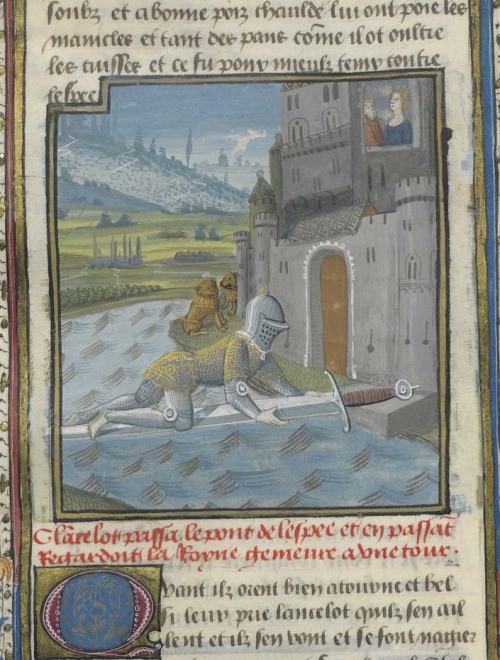 |
| http://ladaria.livejournal.com/461874.html |
and the knight enters to pray. On his exit he meets an elderly monk who takes him to the cemetery. Lancelot sees the graves reserved for Gawain and Yvain. Chrétien
is able to use intertextuality to give more relevancy to his stories and create a broader literary world. The pair comes across a tomb that helps to foreshadow the success of Lancelot. The knight is able to lift the massive stone away from a tomb that was prophesied only to be opened by the person who would emancipate the prisoners of Meleagant's land. The monk is amazed and tries to learn of the identity of the mysterious knight, but Lancelot is able to hold on to his identity. Chrétien continues with Lancelot's encounters with different strangers. At one point Lancelot is forced to decided between Generosity and Compassion when faced with a duel. He finds a loophole in his logic and is able to satisfy both areas of his compassion.
This occurrence helps the reader to understand the eternal war that goes on in our hero. The humble knight crosses the Sword Bridge with minimal injury.
King Bademagu, ruler of Gorre, watches his passage with Meleagant, his son. The king is known for being the exact opposite of his son in all of his mannerisms. He tells his son to welcome this brave knight and to be hospitable to the warrior. Meleagant refuses to give in and hand over his "prize", Queen Guinevere. Bademagu tells his son that he will receive no help from him in order to defeat the knight and the only man who Lancelot should fear is Meleagant. The king rides down to talk with Lancelot and tries to convince him to let his wounds heal before their duel. Lancelot is determined to follow through with his journey quickly and only commits to wait until the next day for the impending battle. People from all over the land hear of the upcoming fight and flock to the castle.
The next morning the battle begins in a frivolous manner and prayers are said for both men. As the battle starts and progresses it is apparent Lancelot is losing. This may be in part because of his injured hands. Queen Guinevere realizes her influence and learns the name of the knight who is
 |
http://www.literaryramblings.com/1000-books-in-10
-years-vol-291-the-knight-of-the-cart-by-chretien-de-troyes |
fighting for her safety. She shouts out to Lancelot and distracts him. He becomes entranced by the queen and she helps him maneuver himself in order to see the her while also fighting Meleagant head on. Lancelot starts to take the upper-hand and Bademagu asks the queen to sway Lancelot so that he will not kill Meleagant. She agrees because of his kindness throughout this whole ordeal. Lancelot immediately listens to the queens words and Meleagant takes advantage of the situation and attacks Lancelot even though the knight had stopped pursuing him. Bademagu stops his son and orders his men to hold him back. The king refuses to let his son use his arrogance as an excuse for his actions. In order to appease both parties the two knights agree to another duel this time in King Arthur's court in less then a year. Queen Guinevere will be freed and given to Lancelot until the next duel where her hand will be up for grabs, again. Lancelot is then taken to the queen who is angered with the knight. He lets the queen leave with a heavy heart.
Our knight is then taken to Kay, who is ashamed to talk with Lancelot. His shame stems from Lancelot being able to complete the task he failed. The seneschal, Kay, informs Lancelot of the drastic difference between King Bademagu and Prince Meleagant. Lancelot then takes his leave and prepares to search for Gawain. He takes with him the volunteer prisoners he freed and Lancelot's legacy is born with his partial defeat over Meleagant. He now has opened the borders of Gorre and allowed people to freely travel in and out of the land.
As Lancelot reaches the border he is captured by the people of Gorre and held captive. Word is taken to the King of the events but he is also told that Lancelot was killed. The king is outraged. Queen Guinevere learns of Lancelot's "death" and becomes distraught. She stops eating and talks about killing herself. Rumors fly back to the captors and Lancelot is told that the queen did kill herself. T
his melodramatic scene alludes to Shakespeare's Romeo and Juliet. The two lovers are hysterical over news about the other's so-called deaths. Thankfully his captors stop Lancelot's suicide attempt and as the captors get close to the city both parties are informed that everyone is still alive.
After arriving in Gorre the king is elated to see Lancelot and places judgement on the native captors. The queen is happy to hear of her lovers return and losses all preconceived judgments about the knight. The two are given time to talk and Lancelot finally asks the queen why she was so cold. She responds,"Were you not shamed by the cart, and frightened of it? By delaying for two steps you showed your great unwillingness to climb into it. That, to tell the truth, is why I didn't wish to see you or speak with you" (262). Lancelot apologizes for his actions and the two plan for their next rendezvous which must be kept secret. That night Lancelot sneaks away in order to see Guinevere at her window. The iron bars placed in the window create dilemma for the lovers. Lancelot is able to move
 |
http://myweb.tiscali.co.uk/
sherwoodtimes/guinever.htm |
the bars but only after cutting his fingers open. The knight is so moved by love he does not notice the injury and falls into the arms of his queen. Chrétien describes their encounter in simple terms but in the end states that, "...I shall let it remain a secret for ever, since it should not be written of: the most delightful and choicest pleasure is that which is hinted at, but never told" (265).
The next morning Lancelot leaves saddened that he must part from his lover. During the night his injured hand stains Guinevere's bed with blood. After getting through the window and straightening the bars he bows down to the queen as if to an altar. Meleagant enters the room and sees blood on both Guinevere's and Kay's sheets and assumes that Kay had taken advantage of the queen.
As an audience we know this not to be true and that the blood on Kay's bed came from his personal wounds. The prince calls for his father and states his accusation. The king is appalled by the thought of a knight that would sleep with his queen and Kay tries to deny the action but the obvious "evidence" makes his arguments void. Meleagant refuses to withdraw his accusation and Kay calls for a duel to clear his name. Guinevere summons Lancelot, who comes to defend Kay. The duel is a replication of the previous scuffle between these two knights. Guinevere is asked by Bademagu to stop the fight and from the words that fall off her lips, Lancelot obeys. Meleagant is forced to stop his attacks and is appeased by the thought that his battle in King Arthur's court will create more shame towards Lancelot. Our knight then rides off to seek Sir Gawain.
After traveling out of the city Lancelot is tricked by a dwarf who kidnaps the hero. His men are concerned about what to do next and they go to find Sir Gawain at the Underwater Bridge. After rescuing the man they tell him all that has happened in his absence. Gawain has the men ride back to Gorre in order to gain information from Bademagu. The king sends out search parties in order to find the lost knight, but everyone comes up short. A messenger brings a mysterious letter to the king who has the it read allowed in order to avoid confusion. In the letter Lancelot tells the people he has returned to Arthur's court and that they should journey back as well. Joy is seen throughout Gorre.
After journeying back to King Arthur's land Gawain, Kay, and Queen Guinevere are joyfully greeted. The people congratulate Gawain for rescuing the queen but Gawain refuses to accept honor. He realizes he has been deceived and King Arthur begins to grief the loss of Lancelot until he sees then queen. The single ladies and maidens of the land organize a tournament in order to help them find husbands. They get the king to agree that the queen will be present at their event. The queen also agrees to this and word of her presence travels. While being imprisoned in Gorre, Lancelot hears of this event. The Lady of his captor's house sees that he refuses any aid and asks that he confide in her. He tells her that he wishes to attend the tournament and swears that he will return when the event has passed. The Lady is scared of the Prince of Gorre and hesitates to appease this request. After some bartering Lancelot is let go, clothed in the home owner's armor.
 |
http://www.celtic-twilight.com/
camelot/chretien/lancelot.htm |
Our knight chooses to lodge in a cramped space in the town of Wurst. He does this in order to shy away from unwanted attention. Chrétien goes into detail about the massive amount of knights who are attending the tournament; the main reasoning behind this large influx of attendance is centered on Queen Guinevere's scheduled appearance.
The next day at the tournament the games begin swiftly. Lancelot, disguised at "the red knight", fights so well that people begin to take notice. The queen, with her suspicions, summons a girl to tell Lancelot to fight poorly. After hearing Guinevere's request Lancelot obeys his love and begins to act cowardly. The crowd, who at first were amazed, mock our knight. At the end of the day people are still perplexed by the abrupt change in the mysterious knight and call him a coward. The next morning spectators and competitors alike flock to the tournament. Many of the knights are described but when Lancelot does not show up people assume he is to ashamed to show his face.
Guinevere has the same girl find her beloved knight and informs him to again do poorly in the games. His response is taken back to the queen who knows without a doubt that it is Lancelot. The girl messenger then returns to our knight with another message from the queen. This time the knight is instructed to do his best,
Lancelot obliges the request and amazes the crowd. The ladies and maidens who had hosted the tournament were distraught by the fact that they all wanted to marry the mysterious knight. They refused to believe that any other man would hold up to his ability and they all went home husband-less. Our knight quickly left the tournament in order to remain mysterious and returned to the prison in order to keep his word.
After returning back to his prison Lancelot is placed in a tower that was built, as ordered, by Meleagant in order to dissipate any possibility of our knight's escape. Meleagant then returns to Arthur's court ready for his scheduled battle with Lancelot. With no sign of the celebrated knight, Gawain offers to duel the prince after the court is given a year to search for their hero. Meleagant agrees to these terms and he returns to his father's court. Upon arrival he boast about his success in Arthur's court. Instead of praising his son, King Bademagu, reprimands his arrogant words and chastises his character. Meleagant is outraged. His father states that the only way Lancelot would not follow through with his word would be if he were imprisoned or dead. Meleagant's sisters hears this statement and resolves to find Lancelot. She rides on her mule for days on end and finally finds the tower that Meleagant constructed. She frees Lancelot and takes him to a private castle where she takes care of the knight. Our knight becomes healthier and stronger and eventually leaves his savior.
The following day Lancelot returns to court, Meleagant appears as well in order to duel Gawain. The prince goes to the court asking if Lancelot had been found and Gawain tells the villain of the sad
 |
http://histonotas.blogspot.com/2011
/06/arturo-el-fin-de-la-caballeria.html |
news that the knight is still nowhere to be found. As Gawain prepares himself for battle Lancelot enters the court. The people are ecstatic to see their beloved knight especially the queen who forces herself to keep her distance. He tells Arthur of the torture that Meleagant put him through and refuses to let Gawain fight for him. Meleagant is stunned to see his prisoner in the court and he concludes that he will fight as best he can until he is overtaken. King Arthur moves the duel to a heath that was known as "...the fairest from there to Ireland" (293). Both knights become enraged throughout the duel but in the end Meleagant is killed. No one shows remorse for the death of the prince and they help Lancelot with his armor.
The story ends with:
"My lords, if I were to tell any more, I would be going beyond my matter. Therefore I draw to a close: the romance is completely finished at this point. The clerk Godefroy de Lagny has put the final touches on
The Knight of the Cart; let no one blame him for completing Chrétien's work, since he did it with the approval of Chrétien, who began it. He worked on the story from the point at which Lancelot was walled into the tower until the end. He has done only this much. He wishes to add nothing further, nor to omit anything, for this would harm the story."
This last paragraph helps the reader to understand the extent to which the story was edited.
Note: William W. Kibler's translation was used for reference.


